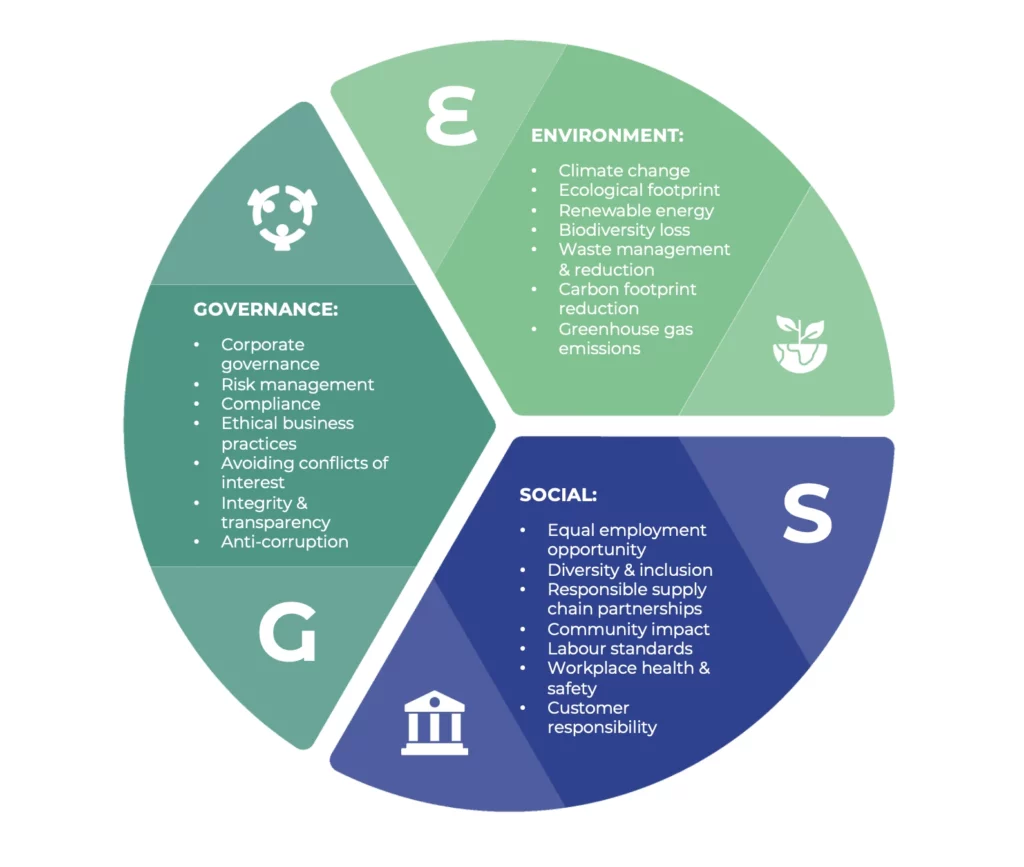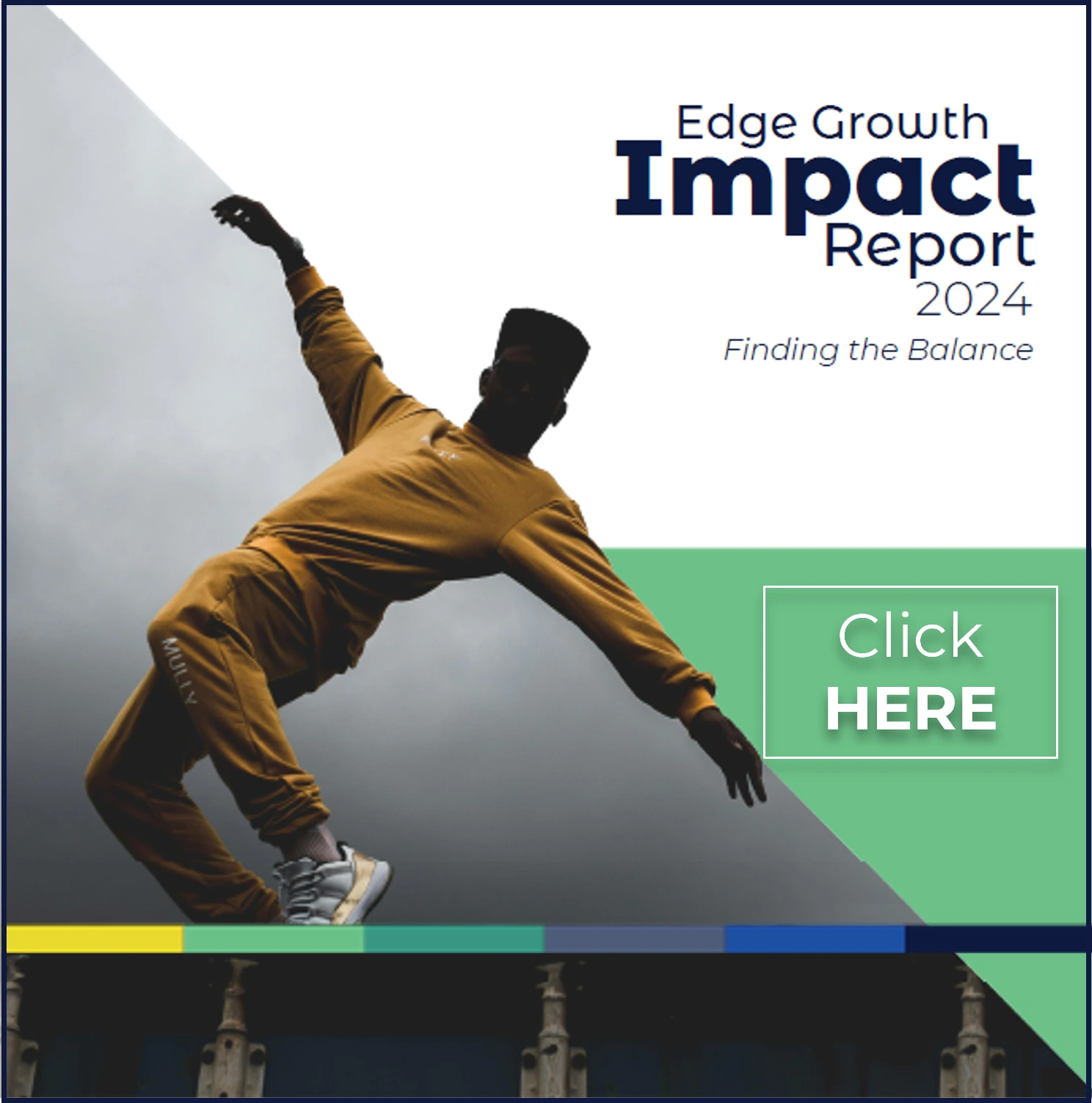Environmental, Social and Governance, abbreviated to ESG, has gained significant attention in recent years. McKinsey & Co report that sustainable funds grew from $5 billion in 2018 to more than $50 billion in 2020 and nearly $70 billion in 2021. A report by PWC suggests that the significance of ESG will only gain momentum in years to follow, predicting that ESG-focused institutional investment will grow 84% from $18.4 trillion in 2021 to reach $33.9 trillion in 2026.
ESG is reframing how businesses approach sustainability by providing a framework to assess the social and environmental impact of a company or investment, alongside financial performance. As society becomes more conscious of the impact of business activities on the planet and people, the integration of ESG considerations has become essential for sustainable and responsible investing and corporate decision-making. Investors and stakeholders increasingly recognise that financial performance alone is not sufficient to assess the long-term sustainability and resilience of a company.
ESG considerations provide a broader lens through which to evaluate an organisation’s operations, risk management practices, and impact on society and the environment. When put into practice, ESG can help organisations embed sustainable business practices into their operations, catalyse shifts to more sustainable supply chains and encourage greater private investment in sustainable development. Integrating ESG factors into investment decisions and corporate strategies can help mitigate risks and identify new opportunities for growth and innovation to drive value creation for both business and society.

The Intersection: ESD and ESG
While the concept of ESG and its recent ubiquity within the South African business landscape is relatively nascent, the practice is not entirely novel. In South Africa, where economic inequalities persist, Enterprise and Supplier Development (ESD) emerged as a pertinent tool for redressing historical imbalances and promoting inclusive economic participation. Referencing the social dimension of ESG, ESD initiatives exist to drive sustainable economic inclusion, foster entrepreneurship, and stimulate employment opportunities. By supporting the growth and development of small and medium-sized enterprises (SMEs), companies can contribute to job creation, skills development, and the overall economic transformation of the country.
Teboho Makhabane, Head of ESG and Impact at Sanlam Investments, proposes that there is great potential for corporates to integrate ESG factors into their ESD efforts. Teboho suggests a strategic approach that involves carefully analysing the intersections between ESG pillars and ESD initiatives, and identifying the various opportunities that arise at each point of intersection. Here we explore the interconnectedness of ESG and ESD within the South African context and examine how they can work together to create sustainable and impactful business practices.
- Environmental
The environmental dimension of ESG, which involves the evaluation of an organisation’s impact on the environment, has gained global prominence due to the escalating climate crisis and environmental degradation. Assessing environmental factors aids in examining the environmental risks a company may encounter and its strategies for mitigating those risks. Companies with robust environmental practices are better equipped to address climate-related risks and capitalise on the transition to a low-carbon economy. In a South African context, the energy crisis is a confronting reality that has accelerated the need for alternative power generation that prioritises sustainable resource use, energy efficiency and emissions reduction.
Sustainable Supply Chains
To integrate the environmental dimension into their ESD initiatives, Teboho advises companies to promote sustainable procurement practices by encouraging the inclusion of environmentally responsible suppliers. Teboho says this can contribute to reduced carbon emissions, resource conservation, waste reduction, and the adoption of eco-friendly production methods within corporate supply chains.
Climate Action
Teboho says that companies can champion climate action through their ESD initiatives by supporting the development of black-owned enterprises in the renewable energy, energy efficiency, and clean technology sectors. By integrating these businesses into supply chains, ESD can contribute to climate change mitigation efforts.Integrating environmental considerations into ESD initiatives can yield significant benefits. By prioritising environmentally sustainable practices, companies can nurture the growth of SMEs that embrace renewable energy, waste reduction, and resource efficiency. This alignment promotes the creation of green jobs, reduces carbon emissions, and fosters the development of a low-carbon economy. - Social
The social dimension of ESG considers a company’s relationship with internal and external stakeholders and emphasises the importance of corporate social responsibility and ethical behaviour. Companies that prioritise social factors understand that building strong relationships with employees, customers, suppliers, and communities leads to long-term shared value creation. They invest in fair labour practices, safe working conditions, and equal opportunities, and contribute positively to social development. By creating positive social impact, businesses can enhance their reputation, attract top talent, and build loyal customer bases.
Economic Empowerment
ESD aims to drive sustainable economic inclusion in our country by empowering black-owned SMEs. ESD can also focus on gender equality and the economic empowerment of women through initiatives that aim to foster female entrepreneurship. Teboho says that this economic empowerment leads to job creation, poverty reduction, and improved livelihoods for historically disadvantaged individuals and communities.
Inclusive Business Practices
ESD initiatives promote inclusivity within supply chains by providing black-owned SMEs with opportunities for growth, access to markets, and skills development. Teboho says that this support is aimed at enabling these enterprises to grow, become more competitive, and meet the requirements of corporate supply chains. By providing support to black-owned SMEs, Teboho says that ESD initiatives enable them to become key suppliers, thereby fostering economic inclusivity and reducing social inequalities.ESG factors emphasise social responsibility and promote inclusive business practices, urging companies to prioritise fair labour practices, diversity and inclusion, and community engagement. Through ESD, companies can provide mentorship, access to capital, and business opportunities to historically disadvantaged entrepreneurs to drive economic inclusion. - Governance
The governance dimension of ESG focuses on transparency, accountability, and ethical decision-making within organisations. Effective governance structures ensure that companies operate with integrity and maintain high ethical standards. This includes having independent and diverse boards, avoiding conflicts of interest, and establishing robust systems for internal controls and risk management. Strong corporate governance promotes trust among stakeholders and safeguards against corporate misconduct, fraud, and corruption.
Ethical Business Practices
Integrating the governance dimension of ESG, Teboho says that ESD initiatives should, and often do, involve mentorship, training, and support to improve the governance and ethical practices of black-owned businesses. This includes promoting transparency, accountability, and responsible business conduct, aligned with good governance principles.
Compliance and Reporting
Companies are encouraged to track and report on the progress and outcomes of their ESD initiatives. Teboho says that this commitment to transparency and reporting aligns with good governance practices and enables stakeholders to assess the effectiveness of ESD efforts.
Good governance practices are a critical component of both ESG factors and ESD. Transparent leadership, ethical conduct, and responsible corporate governance are essential for building trust and ensuring the long-term viability of businesses. By extending effective governance practices to ESD initiatives, companies can create an enabling environment that encourages ethical behaviour, accountability, and sustainable growth among SMEs.
In summary, ESG factors encompass a range of considerations that extend beyond traditional financial metrics. Environmental factors assess a company’s impact on natural resources, climate change, and pollution. Social factors evaluate relationships with employees, communities, and customers, focusing on labour standards, diversity and inclusion, and workplace safety. Governance factors appraise corporate transparency, ethics, and leadership structures. By integrating ESG factors into business strategies, companies can achieve long-term sustainability, risk mitigation, and enhanced stakeholder value.
The integration of ESG factors and ESD initiatives presents a powerful opportunity for businesses to drive sustainable development and inclusive economic growth in South Africa. By aligning ESG considerations with ESD efforts, companies can create a positive impact on the environment, society, and governance practices while fostering economic empowerment and reducing inequalities. By integrating ESG into decision-making processes, companies can create long-term value, mitigate risks, and contribute to a more equitable and sustainable world.



